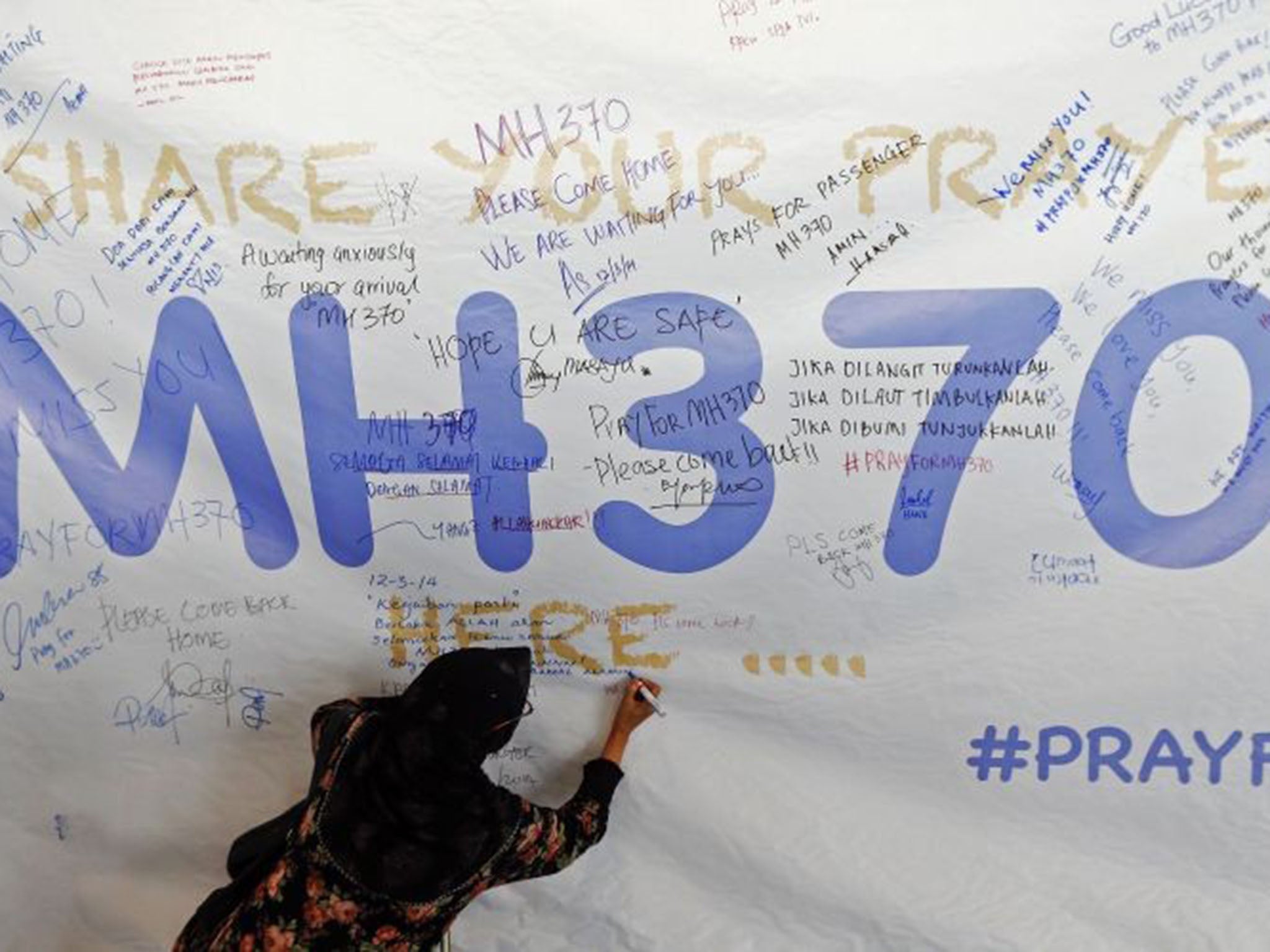MH370 search called off: The final word on missing plane, and no answers for relatives
After almost three years, the hunt for the Boeing 777 and the 239 people on board has drawn a blank

Your support helps us to tell the story
From reproductive rights to climate change to Big Tech, The Independent is on the ground when the story is developing. Whether it's investigating the financials of Elon Musk's pro-Trump PAC or producing our latest documentary, 'The A Word', which shines a light on the American women fighting for reproductive rights, we know how important it is to parse out the facts from the messaging.
At such a critical moment in US history, we need reporters on the ground. Your donation allows us to keep sending journalists to speak to both sides of the story.
The Independent is trusted by Americans across the entire political spectrum. And unlike many other quality news outlets, we choose not to lock Americans out of our reporting and analysis with paywalls. We believe quality journalism should be available to everyone, paid for by those who can afford it.
Your support makes all the difference.On 8 March 2014, Malaysia Airlines flight MH370 disappeared on a routine flight from Kuala Lumpur to Beijing with 239 people on board. Despite a massive international search effort over almost three years, the only traces of the plane that have turned up are fragments of wreckage washed up on the western shores of the Indian Ocean.
A communique from the transport ministers of Malaysia, Australia and China said: “Despite every effort using the best science available, cutting edge technology, as well as modelling and advice from highly skilled professionals who are the best in their field, unfortunately, the search has not been able to locate the aircraft.”
The move confirms a decision six months ago by the three countries to call off the search “in the absence of credible new evidence leading to the identification of a specific location of the aircraft”.
The last contact with the plane took place at 1.19am on 8 March 2014, when Captain Zaharie Shah acknowledged air-traffic control with the words “Goodnight Malaysian three-seven-zero”.
It took the airline a further six hours to tell the world that one of its planes was missing. No distress messages were sent.
An air-sea rescue operation was launched in the South China Sea and the Gulf of Thailand. But a week after the disappearance, the Malaysian Prime Minister, Najib Razak, revealed that a British company, Inmarsat, had shown the jet remained aloft for at least seven hours after the last words were spoken from the flight deck.
Equipment aboard the plane responded automatically to a series of satellite “handshakes”: signals the length of brief text messages. These “pings” were analysed and allowed investigators to deduce the aircraft was flying north-west across southern China towards the Caspian Sea, or south across the Indian Ocean to an area west of Australia, before it was presumed to have run out of fuel and crashed.
The search area was soon narrowed down to the “southern corridor,” and specifically a patch of sea west of Perth in Western Australia.
In September 2014, an Australian-led operation began a comprehensive search of the sea bed to identify anomalies that could be larger elements of the 777, such as engines and landing gear.
At the time, Martin Dolan, the bureau’s Chief Commissioner, told me that he expected to find the aircraft within a year, but added “There is no complete guarantee of success.”
Since then, tens of millions of pounds have been spent on an underwater search covering an area almost as big as England: a 120,000 square km patch of the southern Indian Ocean.
After a flaperon – a wing component – from the lost plane was washed ashore on the island of Reunion, hopes were raised that the mystery could be solved. Malaysia Airlines called it “a major breakthrough for us in resolving the disappearance of MH370”.
But today’s communique said: “The decision to suspend the underwater search has not been taken lightly, nor without sadness.
“We remain hopeful that new information will come to light and that at some point in the future the aircraft will be located.”
Speculation on the fate of the plane has proliferated since the disappearance. Shortly after MH370 was lost, the home of the captain was searched by police investigating the theory that he was responsible for diverting the plane.
An American science writer, Jeff Wise, theorised that the jet had been hijacked on the orders of the Kremlin and flown to Kazakhstan. Later, the French deputy public prosecutor, Serge Mackowiak, said that terrorism was being actively investigated. And the CNN presenter, Richard Quest, said: “I think we’re looking at something more akin to some sort explosive decompression at the front of the plane,” which disabled the controls and prevented the pilots from avoiding a tragedy.
Meanwhile the agony of the relatives of the passengers and crew continues. The communique said: “We again take this opportunity to honour the memory of those who have lost their lives and acknowledge the enormous loss felt by their loved ones.”
Join our commenting forum
Join thought-provoking conversations, follow other Independent readers and see their replies
Comments